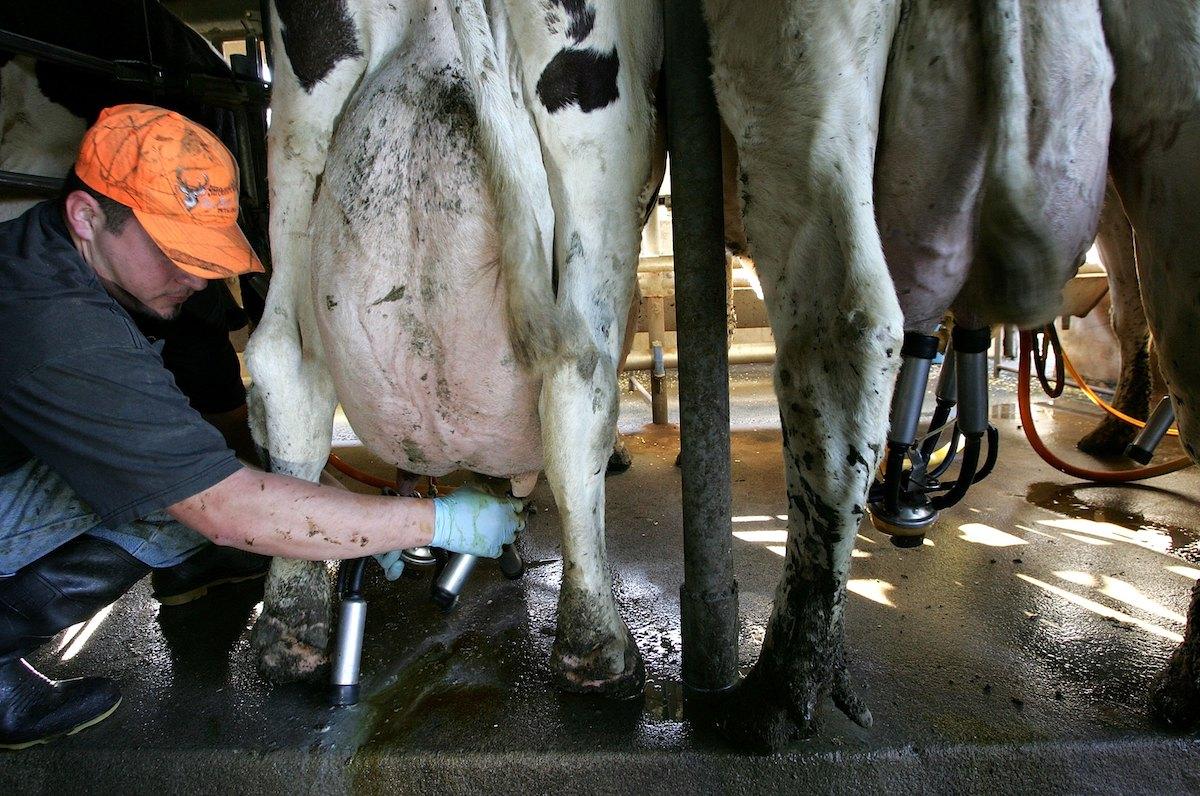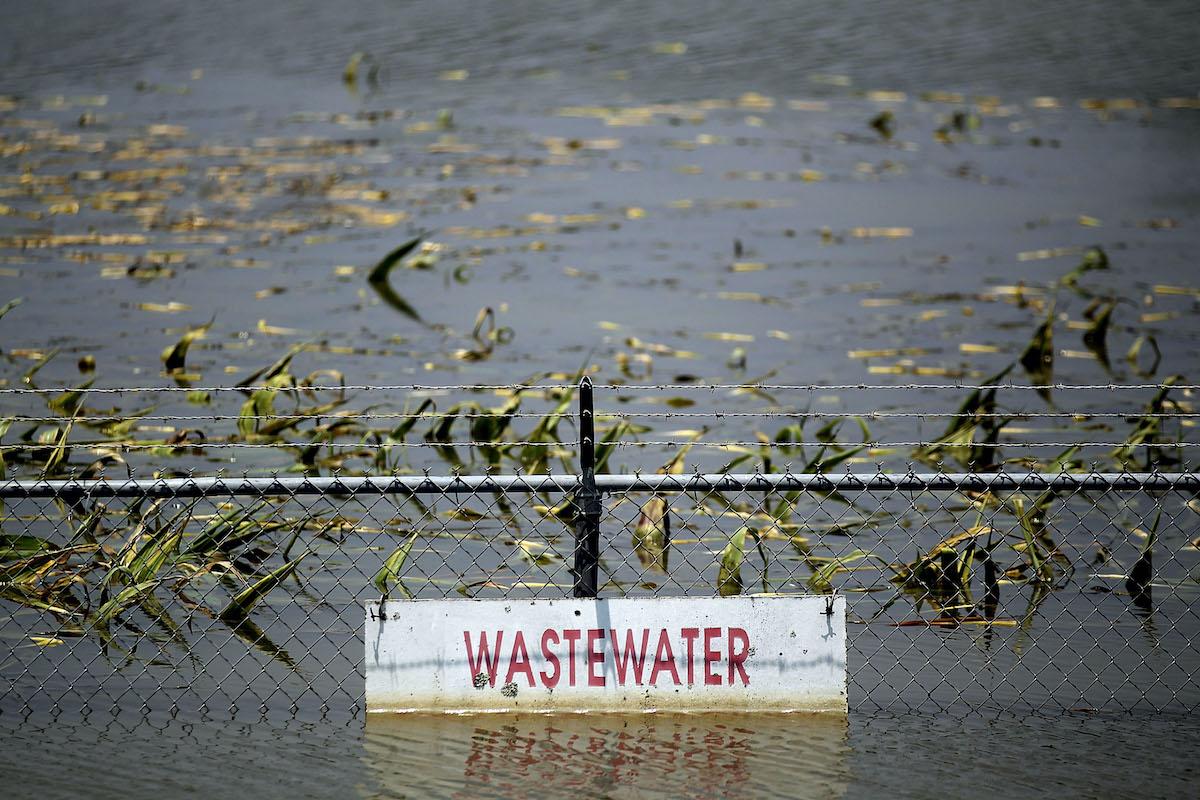A Vegan World Could Essentially End the Climate Crisis — Here's What It Would Look Like
Published May 12 2021, 4:10 p.m. ET

Barn Sanctuary Executive Director Kelly Holt pets Emmy the goat.
The animal agriculture industry is responsible for endless animal abuse, emissions, environmental destruction, public health crises, and so much more. And as the planet continues to wake up to all that, more and more people become inspired to go vegan. But what would happen if everybody went vegan?
For starters, a vegan world would be a much more compassionate, just, and healthy place, and pretty much everyone on the planet would ultimately benefit from the change (or at least, their grandchildren would) — whether they'd like to admit it or not.
And while many vegans would love to wake up one morning and find that the world has gone vegan overnight, unfortunately, that’s not how it’s going to happen. If we ever do achieve a vegan world, it will happen gradually. With each person that goes vegan, the demand for animal products decreases, corporations kill less animals, and we get one step closer to a vegan world.
What would a vegan world look like?
It’s undeniable that a vegan world would look very different from the world today, and the change would positively affect animals, the environment, people, the economy, and so much more. So let’s explore what a vegan world might look like.

In a vegan world, so many less animals would suffer.
A vegan world would spare trillions of animal lives every year.
In terms of animal welfare, a vegan world would be a vast improvement. We’d no longer be slaughtering 72 billion land animals and trillions of fish for food each year, meaning that many less animals would suffer.
The same goes for animals who are bred, abused, and killed for industries besides food, such as fashion (leather, wool, and silk, and more), animal testing for cosmetics, horse racing, zoos, aquariums, circuses, and more. The latter few institutions that exploit animals for profit would ultimately shut down, and be replaced with animal-free entertainment — for example, zoos could turn into nonprofit wildlife sanctuaries or conservation centers, and circuses could use holographic animals.
A vegan world would benefit the environment in numerous ways.

A study out of the University of Oxford found that if the entire planet shifted to vegan diets, it would cut global food-related greenhouse gas emissions by 70 percent. Doing so would severely reduce global warming, reduce other side effects of the climate crisis (such as floods and wildfires), and essentially, significantly curb the climate crisis.
In May 2021, the UN published a report declaring that cutting human-caused methane emissions by 45 percent could help ward off climate catastrophe. About 40 percent of anthropogenic methane emissions come from agriculture, and most of that comes from livestock (primarily cows being raised for dairy and beef). Therefore, the authors believe that adopting “healthy or vegetarian/vegan diets” could severely reduce methane emissions.
In addition to producing greenhouse gases, animal agriculture uses endless natural resources, including land, water, and crops. Livestock actually uses almost 80 percent of agricultural land worldwide (while providing less than 20 percent of humanity’s calories). Raising livestock is also responsible for emitting greenhouse gases and other forms of pollution, meaning abolishing animal ag would give us cleaner water and air.
Not to mention, ending animal agriculture would mean we’d use less land for factory farms and to grow crops; that land could be reforested, and those trees would sequester CO2, among endless other benefits.
A vegan world would mean improved human health and less deaths.
The Oxford study also found that if everyone on Earth went vegan, the dietary benefits alone would prevent 8.1 million deaths each year. The researchers attributed half of the potential avoided deaths to reducing red meat consumption, and the other half to increased consumption of fruit and vegetables and reduced consumption of calories, which would lead to “fewer people being overweight or obese.”
But it’s not only the health improvements that would save lives — the reduced pollution would help us avoid thousands of premature human deaths.
A May 2021 study found that pollution from agriculture causes nearly 18,000 deaths in the U.S. annually. Around 80 percent of those deaths can be attributed to animal agriculture-caused pollution, as reported by The Hill. Not to mention, this issue tends to disproportionately impact BIPOC and low-income communities. So basically, the reduction in pollution alone from shutting down animal ag would save more than 14,400 lives each year.
A vegan world would mean less pandemics.

Residents wearing face masks purchase seafood at a wet market on January 28, 2020 in Macau, China, as coronavirus rates were rising in the country.
According to epidemiologists and the CDC, COVID-19 is a zoonotic disease, meaning it originated in an animal, and then was passed onto a human — and you know the rest. Not to mention, many other health epidemics actually have zoonotic origins as well, including AIDS, avian flu, Ebola, influenza, SARS, and Zika.
So basically, if we lived in a vegan world, we would severely reduce human interaction with animals that could potentially breed the next pandemic, and we could avoid a repeat of the coronavirus.
A vegan world would benefit the economy.
Animals eat a lot of food before they are slaughtered — and most of that food is plants. Therefore, a vegan world would mean Earth could easily grow far more food. According to the World Economic Forum, if just the U.S. went vegan, we could feed 350 million additional people. That’s about half the amount of people who go hungry (about 690 million) around the entire world. The WEF believes this extra food would make up for any money that stands to be lost by shutting down the animal agriculture industry.
As for the employees who work in the animal agriculture industry, we would see the economy gradually shift away from these harmful industries and toward more compassionate alternatives. Farmers could grow crops instead of pigs, or transform their farms into animal sanctuaries; fashion designers who primarily work with animal fabrics would start using sustainable vegan alternatives, such as mushroom leather; and food companies that produce animal products would start producing plant-based alternatives — and we’ve already seen all of those things happening around the world.
A vegan world would mean the redistribution of government subsidies, and more innovative plant-based foods.
As the demand for animal products decreases, so will the supply. And at the same time, the demand for (and therefore the supply of) innovative plant-based foods will increase. We’ve already seen this happen — exhibit A: Impossible and Beyond Burgers. And there’s plenty more innovation where those delicious plant-based products came from.
Additionally, the U.S. government gives meat, egg, and dairy farmers approximately $38 billion in subsidies every year, as per CleanTechnica. Those subsidies help keep the price of animal products low, and keep the industry in business, despite the slowly decreasing demand. In a vegan world, the government would instead give those subsidies to farmers growing crops, which would ultimately help bring down the price of plant-based foods.
A vegan world would be a more compassionate and just world.

A vegan world would bring us much closer to climate justice and ending the climate crisis. It would foster more compassion, and it would be a healthier place for us all to live. After all, is it really possible to achieve world peace when we are slaughtering trillions of animals every year?
Basically, a vegan world would mean a better future for humans all across the Earth — but most importantly, a vegan world would mean humanity has a future.